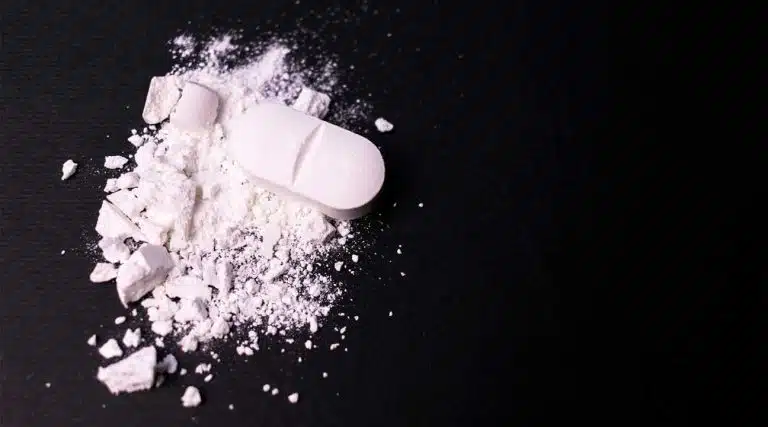Snorting Hydrocodone | Health Risks & Side Effects

Hydrocodone is a common prescription opioid that relieves pain. It is usually taken orally via capsules, tablets, and pills, but can also be abused through snorting.
Hydrocodone has many well-known forms (Lortab, Vicodin, Norco) and is often combined with acetaminophen, a less potent pain reliever.
Snorting hydrocodone can change the drug’s dosage and duration of effects. While snorting hydrocodone can lead to stronger analgesic (pain relief) effects, it is also a form of substance abuse with its own unique risks.
How Hydrocodone Is Snorted
Hydrocodone is one of many prescription opioid analgesics, which see widespread abuse in the United States. Snorting, also known as insufflation, is a well-known method of opioid abuse.
Several steps are taken to convert hydrocodone pills into powder that can be snorted. After the pill or tablet is crushed into powder, the hydrocodone is extracted through various methods.
If a hydrocodone combination product (containing acetaminophen) is used, the hydrocodone may be separated from these other products. The distilled hydrocodone is then inhaled through the nose.
Some hydrocodone products have abuse deterrent properties, and will be less effective when taken improperly. However, extended-release hydrocodone pills are more likely targets for snorting because they contain higher hydrocodone amounts than fast-acting prescriptions.
Hydrocodone is snorted for faster, stronger pain relief and the associated euphoric effects.
Effects Of Snorting Hydrocodone
Hydrocodone will enter the bloodstream directly when snorted, instead of being absorbed through the digestive system. This will allow it to reach the central nervous system (CNS) and bind to opioid receptors faster.
When taken properly, hydrocodone causes sedation and feelings of euphoria. When snorted, a person can expect to feel stronger versions of these effects, resulting in a more intense high.
The Dangers Of Snorting Hydrocodone
Snorting hydrocodone is a form of hydrocodone abuse, because it is not meant to be take intranasally.
Health Effects
When snorting any drug, the nostrils (or nasal passages) are constantly subject to products and substances in the nose. These products will then enter the rest of the respiratory system, including the lungs.
This may lead to problems that will not occur with other forms of drug use, including:
- frequent nose bleeds
- nasal septum perforation (collapse of the cartilage dividing the nostrils)
- hypersensitivity pneumonitis (inflammation of lung tissue)
- lung scarring
Some of these effects can permanently damage your health.
Nasal Septum Problems
Snorting hydrocodone can lead to septum perforations (holes) and necrosis. If untreated, septum perforations can cause frequent runny noses, nosebleeds, and nose pain.
These effects can pile on top of other health effects from snorting hydrocodone, making for an overall unpleasant, painful experience.
Smaller septum holes can be remedied with saline sprays or prosthetic buttons which plug up the holes. Surgery is often required to repair larger septum holes.
Hydrocodone Addiction & Withdrawal
Hydrocodone is a controlled substance, and its addictive qualities are well-known. Taking large doses of hydrocodone over long periods of time can result in addiction to the drug.
Snorting hydrocodone makes addiction more likely due to the strength of its effects and high doses.
Addiction may lead to hydrocodone withdrawal. Once the body becomes used to functioning with hydrocodone, it will react when hydrocodone is not present.
Hydrocodone withdrawal symptoms include:
- insomnia
- vomiting
- muscle and bone pain
A person addicted to snorting hydrocodone may continue snorting it, simply to avoid withdrawal symptoms.
Hydrocodone Overdose
If you are snorting hydrocodone, you are likely inhaling large amounts of the drug at once. This puts you at risk for going over recommended doses. The risk of overdose by snorting hydrocodone is increased.
Hydrocodone overdose can be life-threatening if you or a loved one exhibit these signs:
- respiratory depression (dangerously slowed breathing)
- respiratory failure
- blue lips or fingernails
- clammy skin
Call for help immediately if someone shows any signs of overdose.
Treatment Options For Opioid Addiction
Snorting hydrocodone can cause long-term damage to your body and your mental health. Different treatments can target different areas of damage caused by hydrocodone abuse and addiction.
Drug Detox
A professional drug detox will make hydrocodone withdrawal symptoms much more manageable. Some medications may be prescribed to reduce cravings. Detoxes with a doctor or physician’s guidance have higher chances of success.
Behavioral Therapy
Cognitive behavioral therapy develops mental resistance to hydrocodone abuse. You will learn how to recognize and avoid potential triggers for hydrocodone use. You may participate in both group and individual sessions.
To learn more about our substance use treatment programs, please connect with us today.
Written by Ark Behavioral Health Editorial Team
©2024 Ark National Holdings, LLC. | All Rights Reserved.
This page does not provide medical advice.
Michigan Medicine - Repair of Nasal Septum Perforation | Michigan Medicine
National Center for Biotechnology Information - Hydrocodone snorting leading to hypersensitivity pneumonitis
National Institute on Drug Abuse - Benzodiazepines and Opioids | National Institute on Drug Abuse (NIDA)
National Institute on Drug Abuse - Commonly Used Drugs Charts | National Institute on Drug Abuse (NIDA)


Questions About Treatment?
Ark Behavioral Health offers 100% confidential substance abuse assessment and treatment placement tailored to your individual needs. Achieve long-term recovery.
100% confidential. We respect your privacy.
Prefer Texting?
Our friendly support team is here to chat 24/7. Opt out any time.







 Learn More
Learn More








